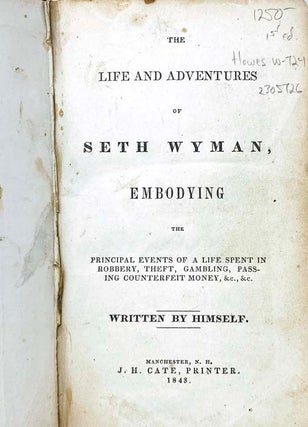The Life and Adventures of Seth Wyman, Embodying the Principal Events of a Life Spent in Robbery, Theft, Gambling, Passing Counterfeit Money, &c., &c.
Manchester, N.H. J.H. Cate, Printer, 1843. First Edition. Hard Cover. Good / No Jacket. Item #2305726
First edition (Howes W-724). Binding repaired by previous owner, corners exposed, spine label mostly absent, front free endpaper absent, a few pages stained.
iv, 310 pp. 8vo. A mid-19th century memoir by a career criminal, published after Wyman's death. "Wyman, Seth (04 March 1784–02 April 1843), thief and author, was born in Goffstown, New Hampshire, the son of Seth Wyman and Sarah Atwood, farmers. Wyman documented his life and career in his posthumously published autobiography, The Life and Adventures of Seth Wyman, Embodying the Principal Events of a Life Spent in Robbery, Theft, Gambling, Passing Counterfeit Money … (1843). His earliest attempts at what he would later term 'roguery' began at a very early age, when he stole a silver dollar from a neighbor's house, explaining to his mother that he had found it in the street. Although Wyman later praised both of his parents in print as honest and upright individuals, he soon graduated to more serious crimes, gaining a sense of satisfaction and accomplishment with each theft. He also displayed a streak of misanthropy, killing a neighbor's trees by girdling them for no apparent gain other than the neighbor's distress. Wyman's father, a wealthy and successful farmer, tried to set up his son in farming on a large tract on the Penobscot River in what is now Maine, but honest labor (at which Wyman would make occasional efforts, including stints at farming, shipbuilding, and sledmaking - usually with stolen tools) never held his attention for long. Early in his career Wyman specialized in shoplifting, at which he became quite adept. His normal modus operandi was to enter a store and engage the clerk or shopkeeper in idle conversation. When another customer entered the establishment or the clerk was otherwise sufficiently distracted, Wyman would quickly stuff some item(s) of value under a large cloak that he wore during his escapades. Watches and bolts of cloth held particular appeal for Wyman, but he did not disdain stealing any item of value. He usually worked alone but would occasionally use one or more assistants. Careful always to stash his booty in a meticulously selected hiding place, Wyman thus avoided detection when the inevitable suspicion generated by his activities led to searches of his dwelling place. According to his autobiography, Wyman enjoyed a long string of uninterrupted successful thefts. Usually moving from place to place in order to avoid the detection of his crimes, Wyman generally indulged in life's pleasures. He was no stranger to hard liquor, often fortifying himself for his more daring crimes with brandy. Enjoying fine dining and card playing, he also paid consistent attention to women, often promising various potential mates the moon and the stars regarding his intentions, on which he seldom if ever delivered. A relationship with an unhappily married woman, Welthy Loomis Chandler, eventually culminated in marriage in Boston in 1808. The couple, who had already had a long-standing common-law relationship - Wyman's first stint in jail was on a charge of adultery, not theft - eventually had six children. While Wyman seems to have genuinely cared for his wife (and his parents), he seems to have formed no other lasting relationship with any other person. During his years of activity, Wyman shuttled between Massachusetts, New Hampshire, and what is now Maine. He was incarcerated on several occasions, during which he attempted (several times successfully) to escape. His Autobiography is replete with tales of fistfights with other men (in which Wyman was inevitably triumphant) and woeful descriptions of the harsh conditions under which he was forced to live during his periods of imprisonment. Late in his career, Wyman took up the passing of counterfeit money (manufactured in Canada and drawn from a variety of banks), at which he seems to have been successful. Wyman relocated to Maine about 1815, having finally worn out his welcome in Goffstown. Although he attempted farming one last time, his old habits proved difficult to leave behind. He was convicted of larceny in June 1817 in Augusta, Maine, and received a three-year sentence to the state prison in Charlestown, Massachusetts. Pardoned after a year (which he spent composing verse), Wyman returned to New Hampshire. While the burden of supporting his wife and children (who had been living in a Boston almshouse) was lifted from the commonwealth of Massachusetts (a factor that helped him gain his early release), Wyman proved no more adept at remaining honest in his old surroundings. After once again stealing cloth (and again being caught), he was sent to the New Hampshire State Prison on 20 April 1820, where he served a full three-year sentence. Returning yet again to Goffstown following his release, he managed to live in relative peace (slowed by the effects of years of hard living as well as a serious injury to his back that he received from a fall from the third story of a factory while assisting in its construction). Plagued by poor health in his later years, he died in Goffstown after having apparently undergone an eleventh-hour conversion to religion. While his lifestyle was hardly worthy of emulation, Seth Wyman's autobiography (published as a cautionary tale) provides a fascinating look at the social mores of the criminal element in early nineteenth-century American society." - American National Biography
Price: $1,150.00


